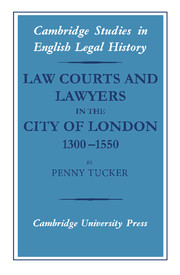Book contents
- Frontmatter
- Contents
- Acknowledgements
- List of abbreviations
- List of figures
- Introduction
- 1 The administration of the law by the city in context
- 2 The distinctiveness of city law and custom
- 3 The city law courts
- 4 The administration of the law in the city's courts: I
- 5 The administration of the law in the city's courts: II
- 6 Judges, jurors and litigants
- 7 The city's law officers
- 8 Legal representation in the city
- 9 The effectiveness of the administration of the law by the city
- 10 Interchange and exchange between the city and the common law
- Appendices
- Bibliography
- Index
10 - Interchange and exchange between the city and the common law
Published online by Cambridge University Press: 04 August 2010
- Frontmatter
- Contents
- Acknowledgements
- List of abbreviations
- List of figures
- Introduction
- 1 The administration of the law by the city in context
- 2 The distinctiveness of city law and custom
- 3 The city law courts
- 4 The administration of the law in the city's courts: I
- 5 The administration of the law in the city's courts: II
- 6 Judges, jurors and litigants
- 7 The city's law officers
- 8 Legal representation in the city
- 9 The effectiveness of the administration of the law by the city
- 10 Interchange and exchange between the city and the common law
- Appendices
- Bibliography
- Index
Summary
INTRODUCTION
Chapter 1 described the ways in which royal decrees, parliamentary legislation and the decisions of the judges of the central courts had the potential to alter city custom, and the ways in which the city sought to defend its jurisdiction, privileges and practices. What it did not do was draw any conclusions about the overall state of play by the end of our period. Likewise, although it was argued in Chapter 2 that a number of London remedies and procedures antedated or preserved ones which were later adopted by the central common-law courts, nothing was said about the significance of this to the development of the English common law as a whole. The aim of this chapter is to remedy both deficiencies.
THE IMPACT OF THE ADMINISTRATION OF THE COMMON LAW ON CITY CUSTOM
There are a number of ways in which developments in the central courts and the national common law could have affected the city's courts and custom. Negatively, the supervisory role of the central courts could have been used to undermine the prestige of the city's courts and litigants' confidence in them. The privileges afforded to officers of the former could have been employed to divert ‘London’ cases into them. The closer alignment between remedies and procedures might simply have enabled the central courts to poach what could, and in earlier days would, have been city litigation.
- Type
- Chapter
- Information
- Law Courts and Lawyers in the City of London 1300–1550 , pp. 350 - 372Publisher: Cambridge University PressPrint publication year: 2007



